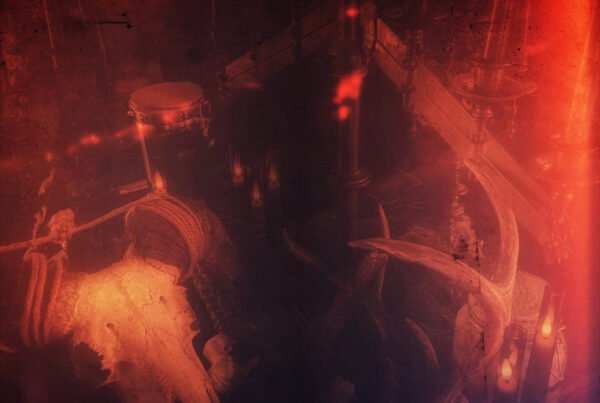The unholy matrimony between reggaeton and black metal, draped in a cloth of shoegaze, on Pyramids’ Pythagoras is ready to rile up the gatekeepers of cultural cool.
Release date: May 2, 2025 | The Flenser | Instagram | Bandcamp
There’s an article that just recently came out in The Atlantic called ‘Is This the Worst-Ever Era of American Pop Culture?‘. Regardless of what you think of the platform (The Atlantic can be obnoxiously overwrought), the piece presents a fair representation of what is often a popular point of conversation between the cultural gatekeepers of the world. In a very miniscule way, we here at Everything Is Noise practice our own form of gatekeeping: I get to pick what records I want to review, which means I can vet them before I dedicate the brain-power to write an article about one. The article, among other points, rightfully shines a light on the difficulty of getting really forward-thinking music heard by more than a few thousand people in the world. Diluted by the expansive nature of the Internet and the even more powerful gatekeepers that determine the algorithms for streaming services and YouTube (god bless their fiber-optic hearts), music that seems destined to define the future simply doesn’t exist like it did in the previous century.
And yet, this very outlook is reductive in practice. Who cares what’s popping up on the Billboard 100? That list of money-making hits from the 20th century used to be populated almost exclusively by American and British artists. At least now there’s a wider representation of the world (even if Sleep Token –SLEEP TOKEN – is currently dominating the list), which goes to indicate that the very idea of a ‘Western culture’ has been rightfully diminished. And it’s within this wash of culture that Denton, Texas experimental metal band Pyramids has unleashed Pythagoras upon the world. So let me be the first to open up the gates to this glimpse into a melding of cultures and a possible peek into the future of American popular culture.
“Fool’s Gold (Mi Vida Ha Ido Pa Atras),” the first single and lead track from the band’s first album in a decade, is a wild amalgamation of genres. It’s almost the perfect example of the gloriously schizophrenic nature of pop culture today, but it’s so far out on those fringes that it hardly counts as being part of the culture. I mean, this is black metal at its subtly beating heart, and that’s as far into the fringes popular music can get in this day and time. And even the black metal is barely there. Buried underneath a hypnotic, repetitive reggaeton beat and swells of guitars dripping in shoegaze, the vocal screeches sound as if they were the proverbial ghost in the machine, an echo oozing its way up through the zeroes and ones of LogicPro. It’s almost enough to make one do a double take.
And it takes more than a double take to absorb everything that’s happening on Pythagoras. While this might be a stretch, listening to the songs on this album is a bit like trying to dissect “Help!” by the Beatles. On the surface, “Help!” appears to be a straight-up pop song. But when you really dig deep, you’ll see that it actually sounds like two songs happening at the same time, and the realization that the song has multiple entry points makes it that much more rewarding to listen to. Pyramids‘ songs aren’t at that technical level, but they are produced in such a way that you can choose how to listen to the song: at any moment you can be transported to the Puerto Rican shoreline, the rainy streets of Manchester, or the cold, unforgiving northlands of Norway.
Second song “Pretty Pigs” exists in this porous world of genre-bending glory. The juxtaposition of reggaeton, shoegaze, and black metal is constant throughout the album. The mix of ethereal clean vocals, with their sultry Bryan Ferry-esque delivery, with Emy Smith’s neoperreo-influenced vocals is harsh enough. Throw in these black metal screeches buried in the mix and explosions of simplistic blast beats and it’s like nothing you’ve heard before. “Pretty Pigs” starts with an abrupt, distorted noise and a wash of guitars and keyboards. The reggaeton beat pulsates underneath the shoegaze wall of noise. The bass drops out and Emy Smith’s sing-song delivery elevates the song to an even brighter spot in the clouds, which is where most of Pythagoras spends its time. But while facing the sun one may be bathed in light, that doesn’t diminish the turmoil and energy pulsating through the cloud itself.
It’s this latter part that’s graced by the black metal influences. That the band can create an environment in which the darkest of the sonic arts creates something so celebratory is nothing less than astonishing. I suppose Zeal & Ardor‘s mix of slavery-era spirituals and blackened death metal is an apt comparison, but they don’t seem to do all of this at the same time. Even Deafheaven‘s Sunbather, another album that threw the gatekeepers of the trve kvlt into a tizzy, wasn’t that far off from the source material. Pyramids‘ music is forward-thinking experimental noise, an inevitable mash up of cultures in a world that’s growing increasingly mixed up, even as it tries desperately to build up walls.
“Bone and Eggshells” has the most direct black metal expression, as it explodes into an industrial rapid-fire assault of blast beats and swirling guitars. The song starts off with Emy Smith’s ethereal, playful vocals which make way for a pseudo-hymnal expression of grief. ‘Hallelujah,’ the band laments, ‘how did you know? Hallelujah, how did you know?‘ It’s as if the very music is struggling with the delicacy and primordial necessity of the bones that support our bodies, and the eggshells from which we all evolved. It’s not so much as what came first, as it is just working on the assumption that everything just evolved simultaneously.
And it’s this simultaneous melding of cultures that’s the most futuristic aspect of Pyramids‘ music. No one asked for Pythagoras to be made, and there’s nothing in the band’s previous catalogue that would suggest such a daring change in direction. Being immersed in the Texas heat, hearing the repetitive, hypnotic electronic drums of reggaeton and neoperreo, and slowly entering the age of fatherdom, the band seems poised to start seeing things through their peripheral vision. The world is closing in around us, and no matter how hard you try to keep the gates, the future will be here before you have the time to paste on your corpse paint, adjust the levels on your chorus pedal, and shovel down a steaming plate of mofongo. Pythagoras makes a valiant effort to show how all of us are a lot closer to each other than we think.






